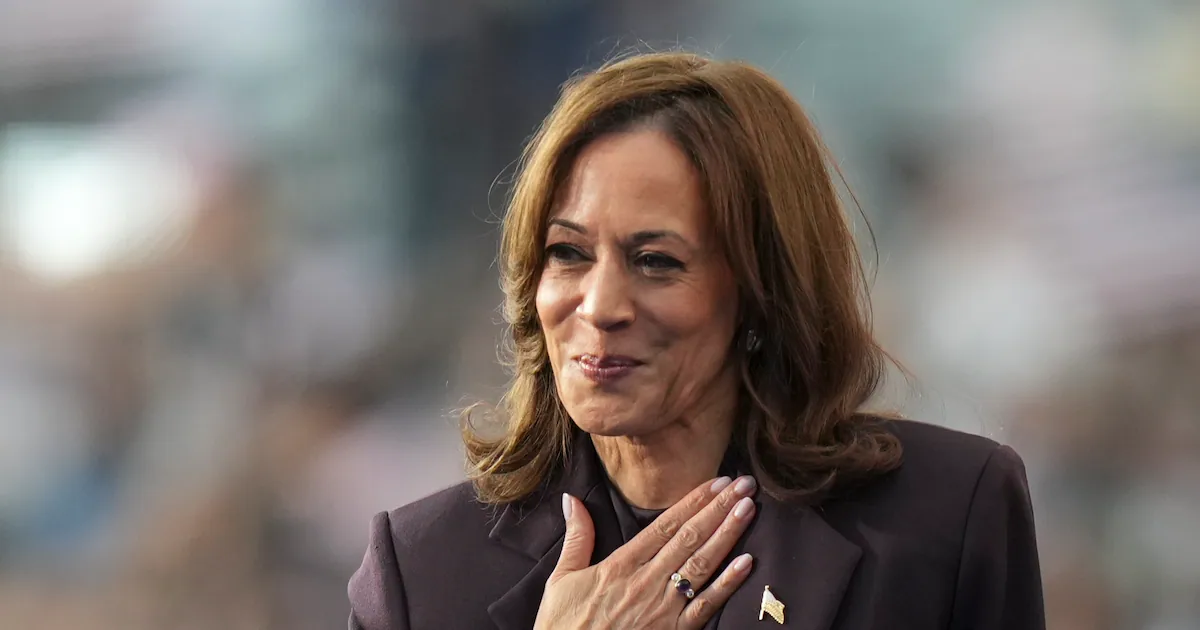
In the acknowledgements of her new memoir, “107 Days,” former Vice President Kamala Harris writes more effusively about Geraldine Brooks than she does about Joe Biden.
Brooks, a Pulitzer Prize-winning novelist who helped craft the book, is praised for her “ferocious and brilliant artistic insights” and Harris says that a friendship developed during their collaboration.
Biden, who chose Harris as his running mate and endorsed her presidential run, gets a polite, one-sentence thank you.
In the disparity lies the crux of “107 Days,” which is a surprisingly engaging story from a politician not known for eloquence. If the Harris campaign vibe was joy, the book about the campaign seems more about settling scores — a curious choice for the woman widely expected to make another run at the presidency.
“I’m not done,” she writes, without detailing what exactly lies ahead.
In writing the book, Harris seemed either unconscious or unbothered by how her own party would respond to her revelations, which are now causing her problems.
Rachel Maddow, for example, told Harris on MSNBC that she was bothered by Harris writing that Pete Buttigieg was her first choice for vice president and that she would have picked him “if I were a straight white man” — the subtext being that America wouldn’t vote for her if she shared a ticket with a gay man.
Harris denied to Maddow that she said that, even though she did, just not in those exact words. (Buttigieg later responded to what Harris wrote by saying, “My experience in politics has been that the way that you earn trust with voters is based mostly on what they think you’re going to do for their lives, not on categories.”)
But the Buttigieg story was just the beginning of the scorched earth throughout the book.
One Democratic strategist told Politico the book “seems to be unhelpful and divisive in a way that makes it hard for her to be the face of the party as we look to the future.” Another operative called it a “gossip book” that is “embarrassing for her, and for all Democrats, considering she was the leader of the party less than a year ago.”
“This is the kind of book you might diplomatically call ‘candid’,” Maddow said while introducing Harris.
The book is critical of both Joe and Jill Biden (at one point, Harris disparages them through the words of her husband) and of the former president’s staff. It reveals personal messages sent to Harris from important Democrats. (The one that’s gotten the most attention is the text California Gov. Gavin Newsom sent when she reached out asking for support: “Hiking. Will call back,” to which she adds, “He never did.”)
The book makes public the “red flags” she saw in her vice president choices, most stridently her concerns about Josh Shapiro, who she asks at one point if he “understood the job of vice president.”
And Harris speaks ill of CEOs, billionaires and various members of the media, especially CNN’s Anderson Cooper, who moderated a town hall during the campaign.
At times, it feels like Harris was not just burning bridges but blaming others for her loss, as when she writes that Biden called her just before her debate with Trump to suggest that she shouldn’t be saying anything bad about him and to “rattle on” about his own debate performances. “I just couldn’t understand why he would call me, right now, and make it all about himself,” she writes.
There has been much speculation about post-election frostiness between Harris and the Bidens; the reasons for it are manifest in this book, but it’s catharsis that comes at a cost.
It’s hard to see how Harris is helped politically, her “candor” having alienated many of the people she needs to support her, not only in a presidential run but in attaining other positions of power such as a cabinet post.
And notably, there is no outreach to the Americans who did not vote for her, and there is no humanity in the Donald Trump she presents, no humor or showmanship that might explain some of his behavior that she criticizes.
In describing the presidential debate, for example, she is exultant when Trump “embarked on his ‘eating the pets’ rant” on the stage, believing that it showed “how unhinged he had become.” But for many in Trump’s base, that line turned into a win — it became a meme and a viral song, and the moment, odd as it was, resonated with Republicans concerned about Democrat policies on immigration and crime.
Harris also repeats the oft-quoted but misleading line that Trump said there would be a “bloodbath” if Harris won, writing about heightened security prior to the election and saying “It was no wonder states were nervous, given Trump’s statement that there would be ‘a bloodbath’ if I won.” (Trump’s actual comment, delivered in a speech to automakers, referred to economic consequences of a Harris presidency.)
She writes like a politician on the stump in the last days of campaign, not a person seeking to understand her opponent and his supporters. And also not like a person loyal to the man who chose her as a running mate.
There is little loyalty shown within “107 Days” and the ongoing book tour, in which Harris is actively contradicting her assertion on “The View” in 2024 that she wouldn’t have done anything different than what Biden did as president.
Biden is no longer in the picture in any meaningful way, but most of the people that Harris writes about are, leaving her the odd man out in a party that is struggling to rebuild and rebrand itself.
Albert Mohler Jr., the conservative president of The Southern Baptist Theological Seminary, summed it up on his podcast: “In a very odd way, I think former Vice President Kamala Harris, in writing this book, has actually, in ways I’m certain she did not intend, helped us.”



